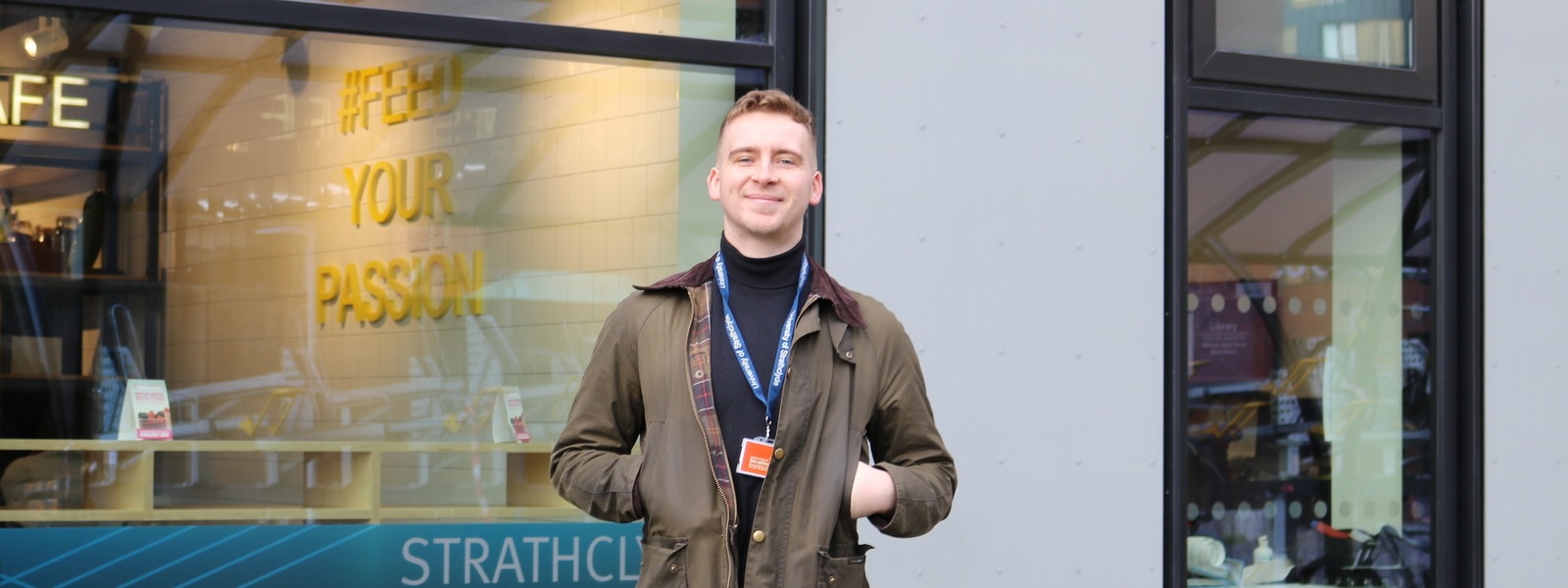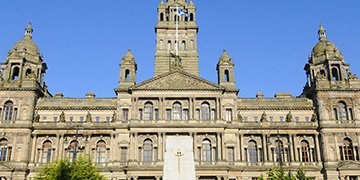Tell us a bit about yourself...
I'm a 2nd year PhD student in the School of Government and Public Policy at Strathclyde. Originally from Dundee, I moved to Glasgow in 2013 to begin my undergraduate in politics at Strathclyde, graduating with First Class Honours in 2017. In this same year, I was awarded a competitive ESRC scholarship, which would allow me to complete the MSc in Political Science and pursue the PhD I am working on today.
Why did you choose Strathclyde for your postgraduate research study?
Having completed my undergraduate degree at Strathclyde, I was already very familiar with its impeccable reputation for world-leading political science research and teaching. For research output and innovation, there really aren't many schools in the UK or even across Europe on the level of Strathclyde in political science. More personally though, the campus has always felt like a second home to me, while both the academic and administrative staff really are a remarkably attentive and supportive group of people - something I have found true across the university in general. If I'm honest, after having such a positive experience at undergraduate level and knowing its stellar reputation, I never really felt like I had to consider anywhere else.
Tell us about the nature of your research?
In a nutshell, my research looks at the impact of local renewable energy systems on poverty and inequality in developed countries. As the climate emergency becomes more urgent, policymakers are turning more towards innovations in energy for solutions. One increasingly popular innovation is that of local energy, such as community owned wind farms and social housing estates that share solar panels, which can reduce emissions but also bring down the costs of energy and create local socioeconomic benefits for users. The practical question at the core of the research is thus: can local renewable energy be used as an effective tool for social and economic justice, as well as for its environmental benefits? Using mostly experimental quantitative methods, my research thus aims to understand the main social, economic and political drivers and impacts of local energy systems on poverty and inequality across the UK and Europe.
What do you like about your research area?
The thing I like most about my research area is the scope for collaboration. Through this field of research, I have had the privilege of working with engineers and computer scientists on exciting new technologies for electrification in developing countries. This has allowed me to travel to lots of wonderful places and meet some incredible people, from individuals in communities in rural Rwanda, to government officials in Spain and leading researchers in the United States. As you can imagine, it is also an immensely fulfilling line of research, with real-world implications for policymakers, people and planet alike.
What's the Strathclyde research community like?
The Strathclyde research community is vibrant and very tight-knit, with lots of activities and opportunities for development. Postgraduate students run various study groups, societies and workshops, while there are always plenty of opportunities to network and hone your presentation and research skills. As already mentioned, I have the privilege of being able to work across departments with engineers and the like and know that this sense of community is very much consistent across the school. One thing that always stands out to me about politics in particular at Strathclyde, however, is that there is very little separation between academic staff and research students. Staff are always very welcoming and sociable, organising socials and guest lectures that provide a regular chance for integration. Their dedication to student development, be it through collaboration on research or simply sharing advice, really is exceptional.
What are the Strathclyde facilities like?
Despite the massive hill in the middle of campus, the facilities at Strathclyde are great. Teaching rooms and lecture halls are all modern and functional, while the huge investment on campus is evident: the new Business School and Technology and Innovation Centre are particularly impressive, with even more work underway to make Strathclyde a really cutting-edge campus. We also have an excellent new sports facility and are located right in the middle of Glasgow's city centre, with its bustling nightlife, shopping precincts and more coffee shops and restaurants than you could ever possibly need. I think it's also worth noting that Glasgow itself really is an incredible place and I'd absolutely recommend it to anyone.
Tell us about the support from your supervisor and the wider Strathclyde team?
I feel really lucky to have the supervisors that I do. Both are global leaders in their respective fields and are enormously supportive both personally and academically. Through them I have had opportunities to work on government policy projects, to publish in respected journals and to meet some of the top researchers and practitioners of local energy, politics and economics in the world. My experience with the wider Strathclyde team has always been overwhelmingly positive too, both in my school and across the university as a whole.
What's the best thing about Strathclyde?
Aside from its reputation, practical policy influence and unbelievable track record of innovation, my favourite thing about Strathclyde has to be the spirit of collaboration. Unlike many places, Strathclyde is a university that recognises the complexity of the problems we face in the world today and encourages work across disciplinary lines to resolve them. More than just the personal benefit this has brought for me, I feel this is an absolutely crucial approach to tackling any of the world's great questions - from climate change to quantum mechanics - and feel proud to work at a university that champions this collaborative philosophy.
What would you like to do after your PhD?
After my PhD, I would like to continue working in my current field, researching, teaching, informing policy and, most of all, helping with the effort to find new and innovative solutions to some of the biggest problems facing the world today.

